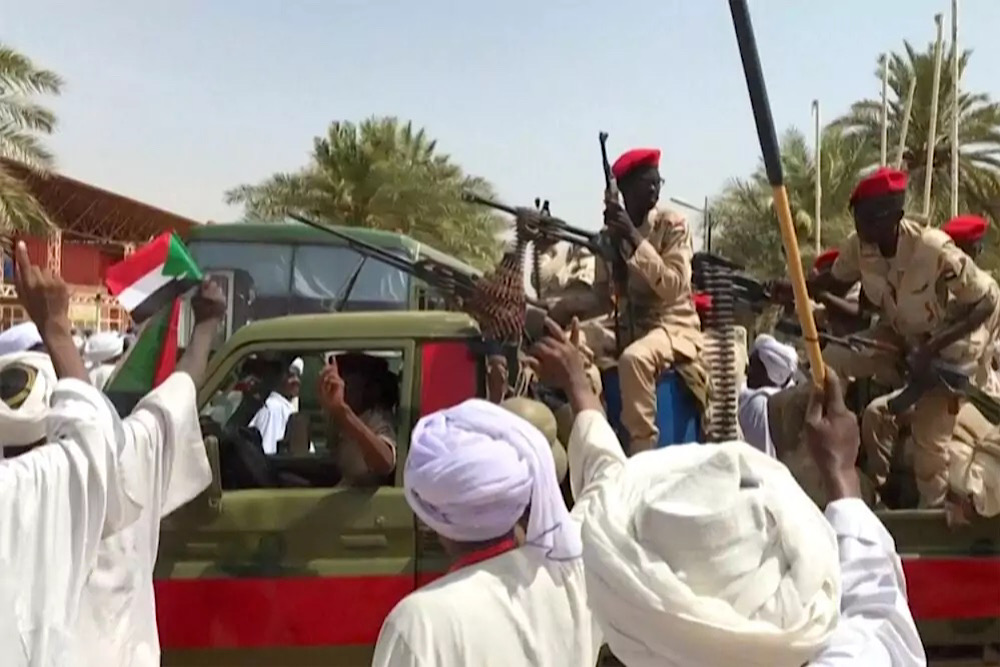Boycott campaign launched against the UAE for 'complicity' in Darfur massacres
Members of the Sudanese diaspora call for action against the UAE for supporting the Rapid Support Forces, a rebel group accused of atrocities after it captured El Fasher, where more than 2,000 people, including women and children, were killed. The Gulf state denies responsibility and announces 0 million in humanitarian aid.
Abu Dhabi (AsiaNews) – A long-running online campaign by members of the Sudanese diaspora against the United Arab Emirates (UAE) and products from the Gulf state is going viral, gaining traction and visibility.
Behind the call to boycott, addressed to travellers, investors, and consumers, are reports of abuse and systematic killings in Darfur at the hands of the Rapid Support Forces (RSF), which reportedly enjoys behind-the-scenes support from Abu Dhabi.
These accusations were repeated in the aftermath of the capture of the town of El Fasher last Sunday (26 October), scene of heavy sectarian violence during the siege and conquest by the paramilitary group.
The fall of the last stronghold of the Sudanese Armed Forces (SAF) in the region was accompanied by large-scale killings, with images reportedly showing RSF fighters boasting about killing civilians, including women, children, and the elderly, while other residents fled the town.
Satellite photos show blood stained streets and widespread destruction, scenes that fuelled outrage and sparked online protests.
According to some witnesses, more than 2,000 people were killed, while the spokesperson for the UN Secretary-General, Stéphane Dujarric, estimates the death toll at least 1,350, but adds that the figure is “an under-representation of the real number of conflict-related deaths”.
The UN High Commissioner for Human Rights also claims to have received horrifying reports of atrocities, including summary executions.
Amid this backdrop of war and violence, human rights groups and experts note that ample documentation point to links between the RSF and the UAE, which are said to be the main backers of the paramilitary group, with weapons and equipment.
In response, social media users are petitioning the United States, one of the UAE’s main weapons suppliers, to impose an arms embargo and sanctions on RSF leaders.
The boycott campaign against the Gulf state is also urging people to cancel trips to the Gulf state, avoid its products, and reconsider business with UAE-based companies.
Advocacy groups are also targeting the gold trade, as Sudan is one of the world's leading gold exporters. Some reports indicate that a lot of the precious metal is smuggled from RSF-controlled mines, which benefit from the trafficking.
Others are framing the boycott campaign within a broader regional context, comparing the UAE's support for the RSF and the atrocities committed by the group in Sudan to Israel's "genocide" in Gaza.
Gaza-based Palestinian journalist Hind Khoudary said that she had planned to visit her father's grave in the UAE once the war was over, but has decided to boycott the country and urge others to do the same.
Responding to the growing outrage, the UAE distanced itself from the violence, condemning what it called attacks against civilians in El Fasher. To this end, it announced an additional US$ 100 million in humanitarian aid.
“The United Arab Emirates condemns the heinous attacks against civilians in El Fasher, in blatant violation of international humanitarian law," the country's permanent representative to the UN, Mohamed Abushahab, told the Security Council.
The diplomatic representative also called for those responsible to be held accountable for their actions. "The warring parties must fully comply with International Humanitarian Law, including providing humanitarian corridors and safe passage and allowing and facilitating rapid and unhindered humanitarian aid," he added.
General Mohamed Dagalo, commander of the paramilitary group, admitted in a recent video that his men had committed “abuses”.
The war in Sudan broke out in April 2023, when long-simmering tensions between the SAF, led by General Abdel Fattah al-Burhan, and the RSF, commanded by General Dagalo, known as Hemedti, escalated into open conflict.
The violence was sparked by a lack of agreement on plans to integrate the paramilitary group into the regular army, with initial clashes quickly morphing into a nationwide war that has resulted in the deaths of tens of thousands of people and the displacement of over 13 million.
An estimated 30 million, over half the population, are facing hunger, with famine declared in some areas, primarily in Darfur.
Both warring sides have been accused of violations. In particular, the United Nations and human rights groups have accused the RSF of war crimes, including a 2023 attack on the Darfur town of Geneina, with hundreds killed and tens of thousands forced to seek refuge in neighbouring Chad.
The army, meanwhile, faces war crimes charges as well, primarily for indiscriminate bombing and the killing of suspected collaborators in areas it took back from the RSF.
17/04/2023 17:26







.png)










